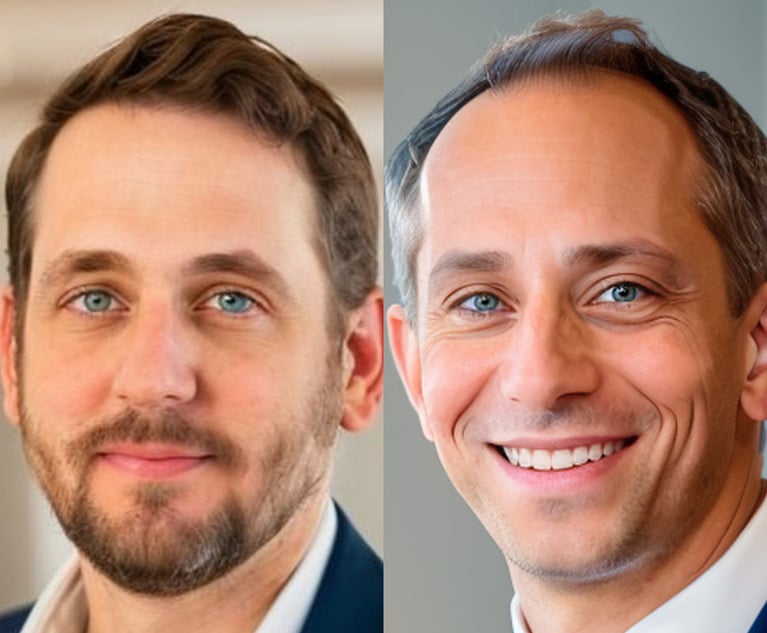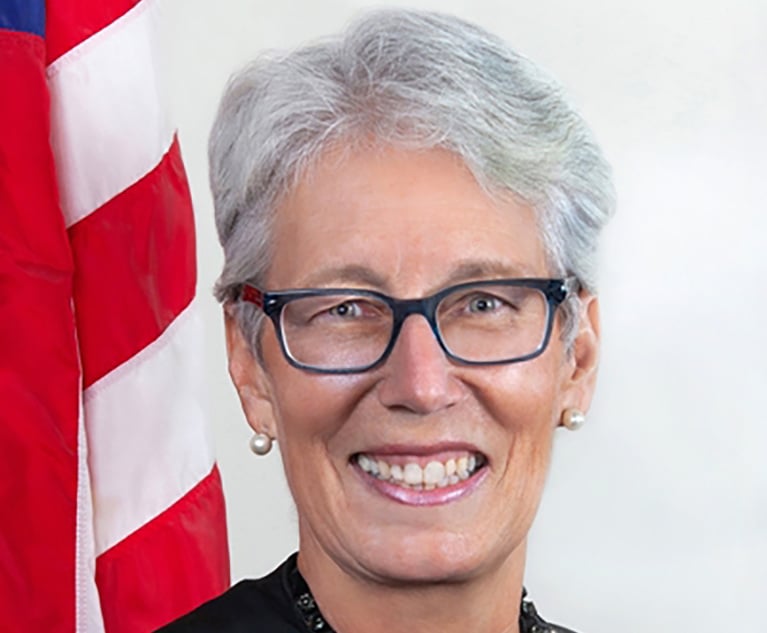 Photo: Shutterstock
Photo: ShutterstockDelaware Court: No Unemployment Benefits for 'Disloyal' Employee
A Delaware trial court has ruled that an employee who was fired for allegedly soliciting customers for a competitor – without first being warned – was not entitled to receive unemployment insurance benefits.
May 06, 2019 at 05:59 AM
4 minute read
The original version of this story was published on Law.com
This story is reprinted with permission from the Insurance Coverage Law Center, the industry's only comprehensive digital resource designed for insurance coverage law professionals. Visit the website to subscribe.
A Delaware trial court has reversed a decision by the state's Unemployment Insurance Appeal Board and ruled that an employee who was fired for allegedly soliciting customers for a competitor – without first being warned – was not entitled to receive unemployment insurance benefits.
The Case
Civic Health Services, LLC (“CHS”), the operator of the Seaford Pharmacy in Seaford, Delaware, said that it terminated Elizabeth A. Imbragulio, who delivered drugs for CHS to its customers, without notice because she was encouraging CHS's customers to use a pharmacy where her son worked.
Ms. Imbragulio sought unemployment insurance benefits, and CHS objected.
The Unemployment Insurance Appeal Board (the “Board”) found that CHS had no policy prohibiting the conduct that CHS asserted Ms. Imbragulio had engaged in and that CHS had terminated Ms. Imbragulio without first warning her against such conduct. Given this, the Board concluded that Ms. Imbragulio had been terminated without just cause, reasoning that Ms. Imbragulio's conduct was not sufficiently serious to justify her termination.
CHS challenged the Board's decision in court.
The Court's Decision
The court concluded that the Board had erred as a matter of law.
In its decision, the court explained that, under Delaware law, an individual discharged for “just cause” was disqualified from receiving unemployment insurance benefits. The court added that “just cause” was defined as a “wilful or wanton act” in violation of either the employer's interests, the employee's duties, or the expected standard of conduct; that “wanton” conduct was conduct that was heedless, malicious, or reckless, but not done with actual intent to cause harm; and that “wilful” conduct implied actual, specific, or evil intent. The court pointed out that wilful or wanton conduct constituted grounds for immediate dismissal without notice if it was sufficiently serious.
The court then rejected the Board's conclusion that Ms. Imbragulio's solicitation and encouragement of CHS's customers to switch to another pharmacy where her son worked was not a sufficiently serious infraction so as to justify her termination without a prior warning because Ms. Imbragulio's solicitation was not equivalent to “hostile and directly-competitive acts” given evidence that CHS tolerated “other employees working for other pharmacies.”
In the court's view, that CHS allowed employees to work at a competing pharmacy did not automatically imply that it was acceptable to directly solicit CHS's customers for a competing pharmacy.
The court decided that the Board “misapplied the applicable law” in reaching its decision. It stated that Ms. Imbragulio's conduct “was certainly against CHS's interests” given that customers were “the lifeblood of a business” and a business could “not exist without them.”
The court found that Ms. Imbragulio's solicitation of CHS's customers for the pharmacy where her son worked “was both an act of disloyalty and threatening to the very existence of CHS's business.” As such, the court added, it certainly was “serious” – and, indeed, “directly hostile to her employer.”
The court stated that a business had “every right to expect that its employees will not sabotage its interests.” Therefore, the court concluded that, as a matter of law, Ms. Imbragulio's conduct justified her immediate termination without notice.
The case is Civic Health Services, LLC v. Imbragulio, No. S19A-01-001 ESB (Del. Super. Ct. May 1, 2019). Attorneys involved include: Tasha M. Stevens, Esquire, Fuqua, Willard, Stevens & Schab, P.A., Georgetown, DE. Elizabeth A. Imbragulio, Seaford, DE.
Steven A. Meyerowitz, a Harvard Law School graduate, is the founder and president of Meyerowitz Communications Inc., a law firm marketing communications consulting company. Meyerowitz is the director of the Insurance Coverage Law Center and editor-in-chief of journals on insurance law, banking law, bankruptcy law, energy law, government contracting law, and privacy and cybersecurity law, among other subjects. He can be contacted at [email protected].
This content has been archived. It is available through our partners, LexisNexis® and Bloomberg Law.
To view this content, please continue to their sites.
Not a Lexis Subscriber?
Subscribe Now
Not a Bloomberg Law Subscriber?
Subscribe Now
NOT FOR REPRINT
© 2024 ALM Global, LLC, All Rights Reserved. Request academic re-use from www.copyright.com. All other uses, submit a request to [email protected]. For more information visit Asset & Logo Licensing.
You Might Like
View All

Jurden Announces 2025 Retirement, Capping 24 Years on Superior Court
3 minute read

Rare Opposition to Proposed Del. Corporate Law Changes Is Voiced to House Committee
5 minute readTrending Stories
- 1Hit by Mail Truck: Man Agrees to $1.85M Settlement for Spinal Injuries
- 2Anticipating a New Era of 'Extreme Vetting,' Big Law Immigration Attys Prep for Demand Surge
- 3Deal Watch: What Dealmakers Are Thankful for in 2024
- 4'The Court Will Take Action': Judge Upbraids Combative Rudy Giuliani During Outburst at Hearing
- 5Attorney Sanctioned for Not Exercising Ordinary Care: This Week in Scott Mollen’s Realty Law Digest
Who Got The Work
Michael G. Bongiorno, Andrew Scott Dulberg and Elizabeth E. Driscoll from Wilmer Cutler Pickering Hale and Dorr have stepped in to represent Symbotic Inc., an A.I.-enabled technology platform that focuses on increasing supply chain efficiency, and other defendants in a pending shareholder derivative lawsuit. The case, filed Oct. 2 in Massachusetts District Court by the Brown Law Firm on behalf of Stephen Austen, accuses certain officers and directors of misleading investors in regard to Symbotic's potential for margin growth by failing to disclose that the company was not equipped to timely deploy its systems or manage expenses through project delays. The case, assigned to U.S. District Judge Nathaniel M. Gorton, is 1:24-cv-12522, Austen v. Cohen et al.
Who Got The Work
Edmund Polubinski and Marie Killmond of Davis Polk & Wardwell have entered appearances for data platform software development company MongoDB and other defendants in a pending shareholder derivative lawsuit. The action, filed Oct. 7 in New York Southern District Court by the Brown Law Firm, accuses the company's directors and/or officers of falsely expressing confidence in the company’s restructuring of its sales incentive plan and downplaying the severity of decreases in its upfront commitments. The case is 1:24-cv-07594, Roy v. Ittycheria et al.
Who Got The Work
Amy O. Bruchs and Kurt F. Ellison of Michael Best & Friedrich have entered appearances for Epic Systems Corp. in a pending employment discrimination lawsuit. The suit was filed Sept. 7 in Wisconsin Western District Court by Levine Eisberner LLC and Siri & Glimstad on behalf of a project manager who claims that he was wrongfully terminated after applying for a religious exemption to the defendant's COVID-19 vaccine mandate. The case, assigned to U.S. Magistrate Judge Anita Marie Boor, is 3:24-cv-00630, Secker, Nathan v. Epic Systems Corporation.
Who Got The Work
David X. Sullivan, Thomas J. Finn and Gregory A. Hall from McCarter & English have entered appearances for Sunrun Installation Services in a pending civil rights lawsuit. The complaint was filed Sept. 4 in Connecticut District Court by attorney Robert M. Berke on behalf of former employee George Edward Steins, who was arrested and charged with employing an unregistered home improvement salesperson. The complaint alleges that had Sunrun informed the Connecticut Department of Consumer Protection that the plaintiff's employment had ended in 2017 and that he no longer held Sunrun's home improvement contractor license, he would not have been hit with charges, which were dismissed in May 2024. The case, assigned to U.S. District Judge Jeffrey A. Meyer, is 3:24-cv-01423, Steins v. Sunrun, Inc. et al.
Who Got The Work
Greenberg Traurig shareholder Joshua L. Raskin has entered an appearance for boohoo.com UK Ltd. in a pending patent infringement lawsuit. The suit, filed Sept. 3 in Texas Eastern District Court by Rozier Hardt McDonough on behalf of Alto Dynamics, asserts five patents related to an online shopping platform. The case, assigned to U.S. District Judge Rodney Gilstrap, is 2:24-cv-00719, Alto Dynamics, LLC v. boohoo.com UK Limited.
Featured Firms
Law Offices of Gary Martin Hays & Associates, P.C.
(470) 294-1674
Law Offices of Mark E. Salomone
(857) 444-6468
Smith & Hassler
(713) 739-1250






